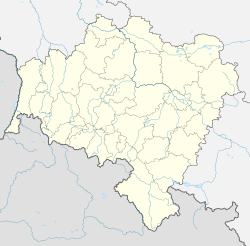Krzyżowa, Świdnica County
Krzyżowa [kʂɨˈʐɔva] (German: Kreisau, until 1930: Creisau) is a village in the administrative district of Gmina Świdnica, within Świdnica County, Lower Silesian Voivodeship, in southwestern Poland.[1]
Krzyżowa | |
|---|---|
Village | |
von Moltke's palace | |
 Krzyżowa  Krzyżowa | |
| Coordinates: 50°47′58″N 16°32′04″E | |
| Country | |
| Voivodeship | |
| County | Świdnica |
| Gmina | Gmina Świdnica |
| Elevation | 230 m (750 ft) |
| Population (approx.) | 220 |
It lies in the historic Lower Silesia region, approximately 10 kilometres (6 mi) southeast of Świdnica, and 51 kilometres (32 mi) southwest of the regional capital Wrocław. The village has an approximate population of 220.
The village is the site of an International Youth Meeting Centre, which primarily brings Polish and German young people together for dialogue and educational programs.[2]
History
The settlement in the Silesian Duchy of Jawor-Świdnica was first mentioned in a 1335 deed. Like most of Silesia, the Krzyżowa area had been annexed by the Prussian king Frederick the Great after the First Silesian War in 1742. The manor was purchased by the Prussian field marshal Helmuth von Moltke the Elder after the Austro-Prussian War of 1866, and from that time on this extensive property was the family seat of the Moltke noble family until 1945. The members of the anti-Nazi resistance group Kreisau Circle met on the property, hosted by Helmuth von Moltke's great-grandnephew Helmuth James Graf von Moltke, who was executed for treason against Germany in January 1945.
After World War II the property was used as a farm, and still today the single houses carry names like cowshed or stable. On 12 November 1989, the Polish Prime Minister Tadeusz Mazowiecki and the German Federal Chancellor Helmut Kohl held a reconciliation meeting there and decided to redevelop the property as an International Youth Meeting Centre. The renovation was predominantly financed by the "Endowment for German-Polish Understanding". In 1998 the Centre was officially opened. Those attending the opening ceremony included the widow of Helmuth James Graf von Moltke, Freya von Moltke, and the initiator Helmut Kohl. The Center is known as the Międzynarodowe Centrum Spotkań Młodzieży in Polish, and as the Internationale Jugendbegegnungsstätte Kreisau in German.
The property has several hectares of grounds, many comfortable guestrooms for youth groups as well as for private guests, a dining room (in a former cowshed), a cafeteria, sports rooms and sports fields, conference rooms (with simultaneous translation arrangement) as well as party rooms (with table tennis and pool). A restored castle containing an exhibition on the Kreisau Circle is also located there.
See also
- Internationale Jugendbegegnungsstätte Kreisau (German article about the Centre).
- International Youth Meeting Center in Oświęcim/Auschwitz (a second youth meeting center in Poland).
- Międzynarodowe Centrum Spotkań Młodzieży (Polish article about the Centre).
References
- "Central Statistical Office (GUS) – TERYT (National Register of Territorial Land Apportionment Journal)" (in Polish). 2008-06-01.
- "Program Offer". Krzyżowa Foundation for Mutual Understanding in Europe. Retrieved 2012-09-13.
Further reading
- Liliana Sadowska & Izabela Taraszczuk: Genius loci als guter Geist. Trinationales Studentenkolloquium zum Widerstand in Kreisau, article about a student conference on resistance movement in France, Germany and Poland in the 20th century (November 3-8, 2007 in Krzyżowa), "Kulturpolitische Korrespondenz", edition nr 1253, 10.03.2008, Stiftung Ostdeutscher Kulturrat, Bonn (German).
- Liliana Sadowska & Izabela Taraszczuk: Polsko-niemiecko-francuskie spotkanie studentów - Krzyżowa - 3-8 listopada 2007 r., article from "Uniwersytet Zielonogórski", edition February 2008, p. 26-27 (Polish).
External links
| Wikimedia Commons has media related to Krzyżowa, powiat świdnicki. |
- "Krzyżowa Endowment for Mutual Understanding in Europe".
- "Kreisau Initiative Berlin".
- "The Foundation". Freya von Moltke Stiftung für das Neue Kreisau. Archived from the original on 2014-12-02. Retrieved 2012-09-13. Charitable organization founded by Freya von Moltke, a member of the Kreisau Circle and the widow of Helmuth James Graf von Moltke.
- Panorama 360° Moltke Palace